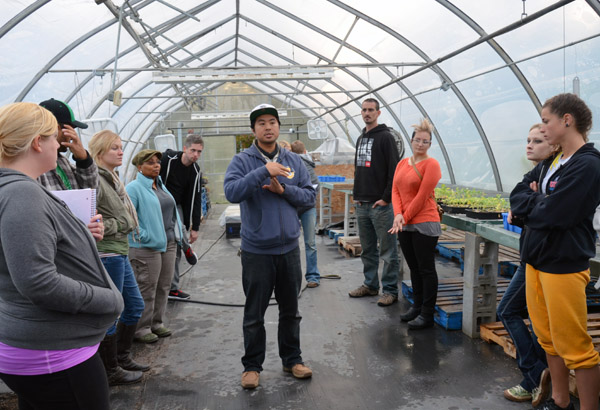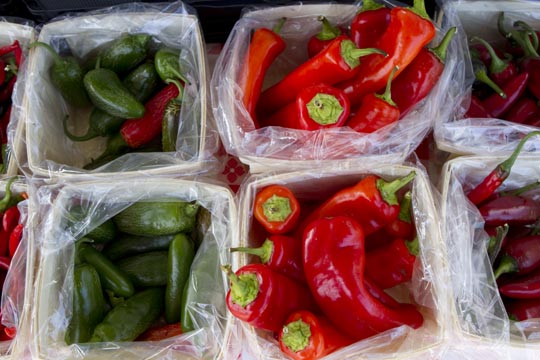 |
| Students in OU's Food Quest course learn about the dynamics of local and organic food production at Earthworks Urban Farm in Detroit. |
In all its capacities, food has long played a role in human social and cultural systems. The consumption and preparation of food defines nations, unites traditions, builds families. And as the world has continued to develop and change, so too does the food industry and various food-philosophy movements.
The Food Quest, an anthropology course at Oakland University explores the ways in which humans produce, consume and relate to food in a global, cross-cultural perspective.
“Understanding the human relationship to food illuminates the relationship we have with our larger environment,” said Tara Deubel, Ph.D., assistant professor of anthropology. “From a global perspective, we need to address why people continue to die of hunger and malnutrition in 2012 when adequate food resources exist.”
“Locally, we need to ask similar questions about why many residents of Detroit are unable to access healthy food on a daily basis in an area now considered to be a "food desert" due to its lack of food resources,” Dr. Deubel continued. “It is critical to re-examine the local and global systems we have put in place and advocate more sustainable alternatives that encourage smaller-scale, local food production and more healthy eating habits.”
The course covers a wide range of topics including changes in human eating patterns, the globalization of the food industry, transnational food politics, debates concerning genetically modified organisms (GMOs), the organic and local food movements, malnutrition and hunger in developing countries, food rituals and eating disorders.
Housed in the Department of Sociology, Anthropology, Social Work, and Criminal Justice, Dr. Deubel’s Food Quest course forces students to examine their own eating habits, and to learn about local food production and the factors that determine the food they eat.
 |
| OU's Student Organic Farm grows organic produce each year. |
This semester, the course’s emphasis is on food sustainability in the Metro Detroit Area. Student research includes community food banks, urban gardens, "farm to table" business models, local farmers' markets, and problems of food availability and access in Detroit.
These topics hit home for several students after a recent trip to the Earthworks Urban Farm in Detroit. Students were able to see global issues enacted on the local level.
"The Earthworks visit was a real eye opener for me,” said junior Kristopher Kildow, Environmental Sciences major. “Before this visit, I never realized how much politics plays a part in what we eat and I ended up learning quite a bit. I was very interested in the cost associated with becoming a certified organic grower and was shocked to learn that someone wanting to sell their organic crops would have to pay so much money and wait so long in order to label their produce for what it is.”
As they learn about the local and global impact of the food industry, several students have developed passions for the local and organic food movements.
"I would like to see the concept of urban gardening spread throughout Detroit and for more people to get involved and to start eating real food, not processed food from the gas stations and little grocers,” said Katherine VanBelle, a senior student majoring in Environmental Sciences. “I found it sad to hear that some city kids think food comes from a gas station. I feel that it's reasons like this that make us one of the unhealthiest cities in America.”
The Food Quest course is cross-listed in anthropology and the Environmental Science Program. It will be available online in the summer 2013 semester and as a full course next fall.
For more information about courses and programs in the Department of Sociology, Anthropology, Social Work, and Criminal Justice,
view the website.


